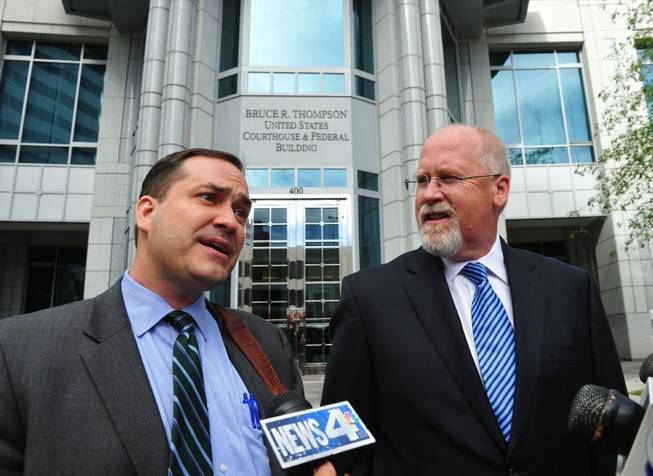
Tim Dunn/Reno Gazette-Journal
Defense attorney John Arrascada, left, with Harvey Whittemore at his side talks to the media after Whittemore’s arraignment Thursday, June 7, 2012, in Reno.
Friday, Jan. 3, 2014 | 4:40 p.m.
A former Nevada powerbroker has won a temporary reprieve from prison after a federal judge agreed to delay his sentence until the U.S. Supreme Court rules in a pending campaign finance case.
U.S. District Judge Larry Hicks in Reno granted Harvey Whittemore's motion to postpone prison in an order signed on New Year's Eve.
Whittemore was convicted last year and sentenced to two years in prison for violating campaign finance laws by using family and friends as "straw donors" to pump more than $130,000 into the campaign of Senate Majority Leader Harry Reid in 2007. Reid, a Nevada Democrat, was never accused of wrongdoing.
Whittemore was scheduled to begin serving his sentence at the end of this month. He has appealed his conviction to the 9th U.S. Circuit Court of Appeals in San Francisco.
But in a motion filed in December, Whittemore's lawyers asked U.S. District Judge Larry Hicks in Reno to delay the sentence, arguing that the high court's pending ruling in an Alabama case challenging individual campaign limits could ultimately have bearing on Whittemore's appeal.
In the Dec. 10 motion, they argued that campaign finance laws have been "twisted into a pretzel" through a series of court decisions and that the law Whittemore was convicted of breaking "faces at least some possibility of being stricken."
The U.S. Supreme Court heard arguments in the Alabama case, McCutcheon vs. FEC, in October. A ruling is expected this year.
In a three-page order, Hicks said that while he believes Whittemore's appeal will be unsuccessful, it "does raise a substantial question of law which could result in either an order for a new trial or reversal on appeal."
Hicks noted that the pending decision from the high court "will be the first time the court will have addressed the applicability of individual campaign contribution limits" since its 2010 decision in Citizens United vs. Federal Election Commission.
In that case, justices said the First Amendment prohibits the government from restricting donations by corporations, associations or labor unions to causes or political action committees not made to a candidate's campaign.
The question in McCutcheon is whether individual campaign contribution limits to candidates may also be unconstitutional.
A federal jury in May convicted Whittemore of writing checks to family members, employees and their spouses, who each then contributed to Reid $4,600, the maximum allowed at the time.
While neither Citizens United nor McCutcheon involve provisions of law at the heart of Whittemore's case, "it is reasonably foreseeable that the Supreme Court could rule in a broad fashion which may be favorable to Whittemore's appeal," Hicks wrote.

Join the Discussion:
Check this out for a full explanation of our conversion to the LiveFyre commenting system and instructions on how to sign up for an account.
Full comments policy